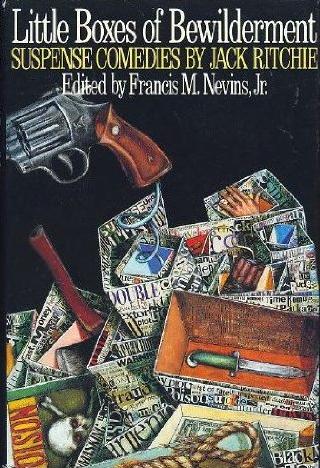Saturday, December 5: Mississippi Mud
IF I WERE A RITCHIE MAN
by John M. Floyd

Actually I am, and have been since I first read one of his stories. I believe I’ve heard my CB colleague Rob Lopresti say he’s a devoted fan as well.
I’m referring to the late Jack Ritchie, one of America’s most prolific short story writers. In my view, he was also one of the most talented.
Little Boxes of Entertainment
I had never even heard of him before my acquaintance in the mid-nineties with Larry Sternig, a literary agent who passed away in 1999. Larry was one of those rare agents who represented the writers of not only novels but short stories, and several weeks after he took me on as a client he mailed me two of Jack Ritchie’s three collections of short mysteries and told me to read them. One was “A New Leaf and Other Stories” (1971), the other was “Little Boxes of Bewilderment” (1989). Larry advised me, as gently as he could, to not only read both books but study them closely, and try to learn from them. He also told me to take good care of them, and to mail them back to him when I was done. I soon understood why: collections of Jack Ritchie’s fiction are hard to find. (I own only one of them, in hardcover, although I have many more of his stories squirreled away in anthologies and in back issues of mystery magazines.)
I later found out that Ritchie was also one of Larry’s clients, for many years. And even though I’m not sure how much of it is evident in my published work, I have learned a great deal from reading Ritchie’s short fiction. For one thing, he made sure his tales were, for lack of a better word, clever. It’s as if it wasn’t enough for him to merely write good stories — the plots were always delightfully different, somehow, from all other writers’, different even from other plots in his own stories. He loved to insert surprises, and not just at the end; his twists and reversals often also occurred during the middles, sending the story action off in an unexpected direction.
Minimalism
Another good thing about Jack Ritchie’s short stories: They were always fast-paced and full of dialogue, his style tight and focused. He almost never furnished detailed descriptions of people or places. Anthony Boucher once said, “What I like most about [his] work is its exemplary neatness. No word is wasted, and many words serve more than one purpose. Exposition disappears; all needed facts are deftly inserted as the narrative moves forward.”
Like Ed Hoch and others, Ritchie preferred the short form to the long. In his words, “I’ve always felt that there hasn’t been a novel published that couldn’t have been a better short story.” In fact I believe his only attempt at a novel was a book called Tiger Island, which I have never even seen, much less read.
Not that it matters, to me. His short stories supply all the entertainment I need.
Ritchie Man, Con Man, Boogeyman, Thief
Since he would probably have been successful writing in any genre, I’m glad he chose the one that he did. Between 1953 and his death in 1983 Jack Ritchie wrote and sold hundreds of short mystery/suspense stories to magazines like EQMM, Adam, Manhunt, Mike Shayne Mystery Magazine, Woman’s World, and New York Daily News; 116 of his tales appeared in AHMM alone. He also wrote for both “Tales of the Unexpected” and “Alfred Hitchcock Presents,” and in the period between 1961 and 1979 his works appeared 17 times in The Best Mystery Stories of the Year.
My favorites include “The Absence of Emily” (an Edgar winner in 1981), “The Best Driver in the Country,” “Remains to Be Seen,” “The Green Heart” (adapted into the 1971 movie “The New Leaf”), “By Child Undone,” and “Traveler’s Check” — but the truth is, I’ve never read a Ritchie story I didn’t like. If you try him, I bet you won’t either. And if you’ve already sampled his stories, chances are you’re as big a fan as I am.
He was — and remains — one of the best.




















Great column. I’ve writte about Ritchie before and said I have probably stolen more from him than any other single writer. He invented what I call the Unknown Narrator story – in which the reader knows nothing about the main character except what people say about him – and I’ve used that at least three times. My character Uncle Victor wouldn’t exist without Ritchie’s Henry Turnbuckle – both characterized by an utterly unjustified self-confidence. One of the greats.
Many thanks, Rob. I forgot to mention Turnbuckle. For those who are interested, THE ADVENTURES OF HENRY TURNBUCKLE was the third of JR’s short story collections — and is just as hard to locate as the other two.
A Ritchie revival is long overdue.
Criminal Brief should do a column on pun titles, led by John and Rob.
Thanks! Words about Ritchie are always a welcome gift in any holiday season! There is a website about him maintained (I think!) by his daughter,
As soon as I saw his name, I was sure I had read at least one of his stories somewhere. The first one I found that I remembered was “Anyone for Murder?”, which was also adapted into a great episode of The Alfred Hitchcock Hour. That was enough to convince me I’d like to find more.
The episode is online here: http://www.hulu.com/watch/13963/alfred-hitchcock-hour-anyone-for-murder#x-0,vepisode,1,0
I just bought a copy of “Little Boxes of Bewilderment” and will be reading, studying, and (hopefully) learning over the next few weeks. Thanks for the tip.